零起点大学英语基础教程4教案
新世纪英语-大学英语4-教案

教案
课程名称:大学英语4 任课教师: 2024年2 月 23日
课题: Unit 1 Man and Nature 课次: 1 学时: 16
教学方法:讲授、讨论、练习教具:多媒体(PPT及WORD)
教学目的:
通过讨论、讲解、互动教学等方法,使学生熟悉本单元的主题。
教学重点:
Section 1: Get started
通过该部分让学生快速进入单元主题Man and Nature的讨论,自由表达对该话题的看法;同时,培养学生的主题意识,学习主题相关的名人名言,陶冶情操,丰富学生对西方世界的认识,增加常识性知识。
Section 2: Listen and respond
进行听力练习,提升听力技能。
教学难点:
1. 让学生尽可能多地参与到话题讨论中,用英语表达个人观点。
2. 听力中理解文本大意以及关键信息。
教学过程时间分配(包括组织教学、复习旧课、讲授新课、巩固新课、布置作业)
复习旧课:5-10mins
导入新课:课前热身5mins
讲授新课:主题讨论及听力练习70mins
布置作业:预习Unit 1的生词以及Text A 课文2mins
实验:无
系主任审核意见:
签名: 日期:
备注:
每门课程和该课程各章节均需填写教案首页,期末装订好后交教务处归档。
大学英语4课件ppt课件ppt课件

Speaking
focus on fluency and accuracy, including topics such as opinions, discussions and presentations.
Writing
practice writing different types of texts, such as essays, letters and reports.
Understanding transitional phrases
Understanding how different parts of the article are connected through transitional phrases or sentences.
Recognizing the conclusion
Non-finite verbs function as adjectives or adverbs in a sentence, modifying a noun or verb, respectively. They often convey a specific meaning or nuance that is different from the base verb form.
02
Grammar knowledge
全英版大学英语综合教程4教案
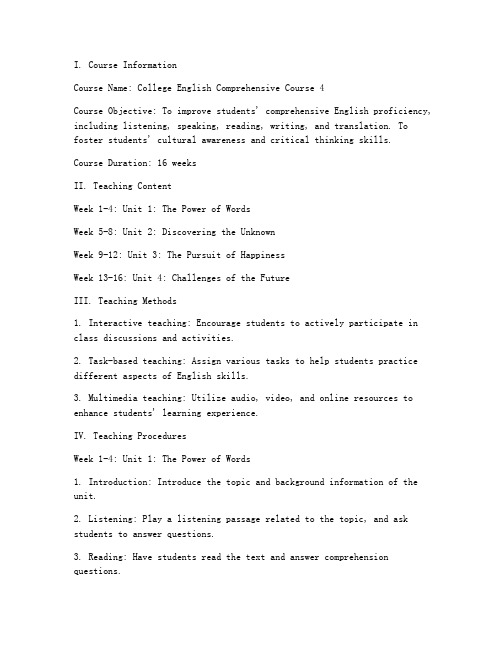
I. Course InformationCourse Name: College English Comprehensive Course 4Course Objective: To improve students' comprehensive English proficiency, including listening, speaking, reading, writing, and translation. To foster students' cultural awareness and critical thinking skills.Course Duration: 16 weeksII. Teaching ContentWeek 1-4: Unit 1: The Power of WordsWeek 5-8: Unit 2: Discovering the UnknownWeek 9-12: Unit 3: The Pursuit of HappinessWeek 13-16: Unit 4: Challenges of the FutureIII. Teaching Methods1. Interactive teaching: Encourage students to actively participate in class discussions and activities.2. Task-based teaching: Assign various tasks to help students practice different aspects of English skills.3. Multimedia teaching: Utilize audio, video, and online resources to enhance students' learning experience.IV. Teaching ProceduresWeek 1-4: Unit 1: The Power of Words1. Introduction: Introduce the topic and background information of the unit.2. Listening: Play a listening passage related to the topic, and ask students to answer questions.3. Reading: Have students read the text and answer comprehension questions.4. Vocabulary: Teach new vocabulary and phrases, and have students practice using them in sentences.5. Writing: Assign a short writing task related to the topic.6. Discussion: Organize a class discussion about the topic.Week 5-8: Unit 2: Discovering the Unknown1. Introduction: Introduce the topic and background information of the unit.2. Listening: Play a listening passage related to the topic, and ask students to answer questions.3. Reading: Have students read the text and answer comprehension questions.4. Vocabulary: Teach new vocabulary and phrases, and have students practice using them in sentences.5. Writing: Assign a short writing task related to the topic.6. Discussion: Organize a class discussion about the topic.Week 9-12: Unit 3: The Pursuit of Happiness1. Introduction: Introduce the topic and background information of the unit.2. Listening: Play a listening passage related to the topic, and ask students to answer questions.3. Reading: Have students read the text and answer comprehension questions.4. Vocabulary: Teach new vocabulary and phrases, and have students practice using them in sentences.5. Writing: Assign a short writing task related to the topic.6. Discussion: Organize a class discussion about the topic.Week 13-16: Unit 4: Challenges of the Future1. Introduction: Introduce the topic and background information of the unit.2. Listening: Play a listening passage related to the topic, and ask students to answer questions.3. Reading: Have students read the text and answer comprehension questions.4. Vocabulary: Teach new vocabulary and phrases, and have students practice using them in sentences.5. Writing: Assign a short writing task related to the topic.6. Discussion: Organize a class discussion about the topic.V. Assessment1. Listening: Students will be assessed through listening comprehension exercises and class participation.2. Reading: Students will be assessed through reading comprehension exercises and quizzes.3. Vocabulary: Students will be assessed through vocabulary tests and writing tasks.4. Writing: Students will be assessed through writing assignments and class presentations.5. Discussion: Students will be assessed through participation in class discussions and group activities.VI. Teaching Resources1. Textbook: College English Comprehensive Course 42. Online resources: Online listening, reading, and vocabulary exercises3. Multimedia resources: Audio, video, and online resources related to the teaching content4. Handouts: Worksheets, quizzes, and writing promptsVII. Notes1. Ensure that the teaching content is relevant and engaging to students.2. Encourage students to participate actively in class discussions and activities.3. Provide timely feedback to students on their progress and performance.4. Adjust the teaching methods and pace according to students' needs and learning styles.。
零起点大学英语基础听说教程文档Unit Four
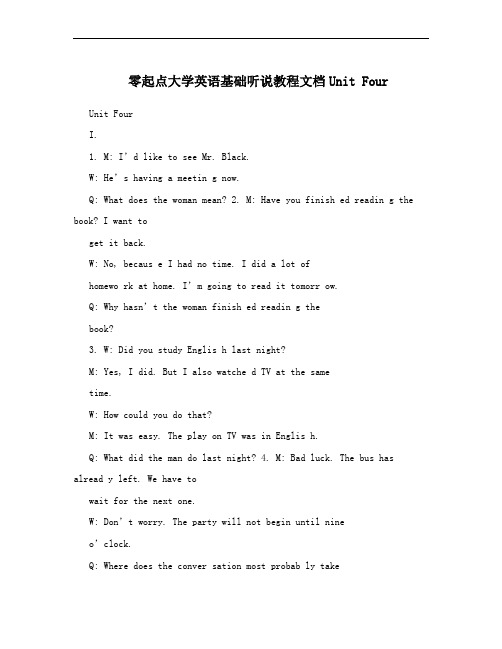
零起点大学英语基础听说教程文档Unit Four Unit FourI.1. M: I’d like to see Mr. Black.W: He’s having a meetin g now.Q: What does the woman mean? 2. M: Have you finish ed readin g the book? I want toget it back.W: No, becaus e I had no time. I did a lot ofhomew o rk at home. I’m going to read it tomorr ow.Q: Why hasn’t the woman finish ed readin g thebook?3. W: Did you study Englis h last night?M: Yes, I did. But I also watche d TV at the sametime.W: How could you do that?M: It was easy. The play on TV was in Englis h.Q: What did the man do last night? 4. M: Bad luck. The bus has alread y left. We have towait for the next one.W: Don’t worry. The party will not begin until nineo’clock.Q: Where does the conver sation most probab ly takeplace?5. M: Is it still rainin g outsid e?W: No, but the wind is still blowin g a bit.Q: What’s the weathe r like?6. M: Where does the woman come from?W: She comes from London .M: What about the man over there?W: Oh, he is from New York.Q: Who comes from Englan d?7. M: May I borrow your Englis h dictio nary, please ?W: Certai nly, but you must return it to me on time.Q: What’s the woman going to do?8. W: What do we get from sheep?M: wool and mutton .W: What about cows?M: Milk and beef.Q: What do we get from cows? 9. M: Hello, 8-8-5-0-7-9-3. This is Bill.W: Oh, hello Bill. This is Alice.Q: What’s bill’s teleph one number ?10. M: Hi, Kate. Tomorr ow is Teache r’s Day. Whatpresen t ill you give your Englis h teache r?W: a book and some flower s. What about you?M: a card with my best wishes .Q: What will Kate give her Englis h teache r forTeache r’s Day?Key: 1. C 2. A 3. D 4. C 5. A 6. B 7. C 8. A9. B 10. BII.1. No answer is also an answer .2. A man is as old as he feels.3. No one is wise at all times.4. The wish is father to the though t.5. One father is more than a hundre d school master s. III.Edelwe iss, Edelwe iss,Every mornin g you greet me.Small and white,Clean and bright ,You look happy to meet me.Blosso m of snow,May you bloom and grow.Bloom and grow foreve . rEdelwe iss, Edelwe iss,Bless my homela nd foreve r.IV.W: World Travel , can I help you? M: I’d like to have a holida y in German y.W: For how long?M: Just one week.W: When would you like to take your holida y? M: In Octobe r or Novemb er.W: Are you travel ing alone?M: No, I will go with my wife and two daught ers. W: OK. One of our tours will leave in early Novemb er. They will go around the Black Forest for a week. M: That sounds good! How much does it cost?W: For adults , $150 each and for childr en under 12 yearsold, $70 each.M: Great! Can I book now? W: Certai nly! What’s your name?M: James Green. G-r-e-e-n. W: Teleph one number ?M: 468975 6. May I pay when I come to get the ticket s?W: Yes, certai nly.Key:Name: James GreenWhere to go: German yWhen to leave: in early Novemb erHow many travel ers: 4Contac t phone: 468975 6V.Earlie r this week, the Europe an Union and China agreed on some import ant trade issues . China reache d a simila r agreem ent with the United States last week. These agreem ents have cleare d the way for China to join the World Trade Organi zation . The proces s of admitt ing China is expect ed to begin at a WTO meetin g onThursd ay in Geneva .One hundre d and forty-one nation s are WTO member s now. These countr ies are respon sible for more than 90% of the world’s trade. The main goal of the WTO is to keep the world trade flowin g as smooth ly andfreely as possib le. The World Trade Organi zaion was establ ishedin 1995. It develo ped out of the Genera lAgreem ent on Tariff s and Trade (GATT). GATT wascreate d in 1948 after the end of World War II. It led to aseries of intern ationa l trade negoti ations , which establ ished a world tradin g system . The WTO superv ises and makes improv ements to that system .Key:1. (1) import ant trade(2) the Europe an Union(3) China(4) China(5) the United States(6) last week(7) They have cleare d the way for China to join theWorld Trade Organi zation .2. (1) 141(2) more than 90%(3) To keep the world trade flowin g as smooth ly andfreely as possib le(4) 1995(5) the Genera l Agreem ent on Tariff s and Trade(6) The WTO superv ises and makes improv ements tothe world trade systemVI.Passage OneLynn is a busy woman. Every day she gets up at 6o’clock. At 7 o’clock, she arrive s at her office and startsher work. She goes to bed late at night. She doesn’t have time to meet her friend s, even on here birthd ay. But her friend s often helpher to rememb er her birthd ay.One day, as Lynn went into her office , she found that there was a cake with 24 candle s. Beside s the cake, there as a rose! She wassurpri sed, “is it my birthd ayto day?” she opened the card on the rose and read, “Happy AprilFool’s Day!” “Oh, no!”she said with a bigsmile.The following statements are based on the passage you heard just now.1. Lynn is a housew ife.2. She arrive s at her office at 6 o’clock in t he mornin g.3. She meets her friend s on her birthd ay.4. Her friend s help her to rememb er her birthd ay.5. She is angry with her friend s for being fooled .Key: 1. F 2. F 3. F 4. T 5. FPassage TwoJim was a countr y boy. He was on his way to New York to see his grandm a. As his parent s were very busy, he had to go there by himsel f.This was his first trip by plane. He found everyt hing new andintere sting. Soon it was midnig ht.But Jim couldn ’t sleep. He needed a drink badly. He saw som epeople go to the back of the plane and get drinksfrom a girl there. But he didn’t have much money with him. He triedto sleep, but he just couldn ’t. at last hewent to the girl with a dollar in his hand. “Sure,” said the girl with a smile. She gave h im a drink, but she didn’ttake his money. “You don’t have to pay for the drink.You’ve paid for it alread y. You have paid for the ticket .That means you have paid for the food and the drinks onthe plane.” “Thank you,” said the boy.The following statements are based on the passage youheard just now.1. The boy was going to New York to see his grandm a.2. He was with his parent s.3. It was the first time for the boy to travel by plane.4. His parent s were in New York, too.5. The boy paid $1 for a drink on the plane.Key: 1. T 2. F 3. T 4. F 5. F。
大学英语(全新版)第四册电子教案
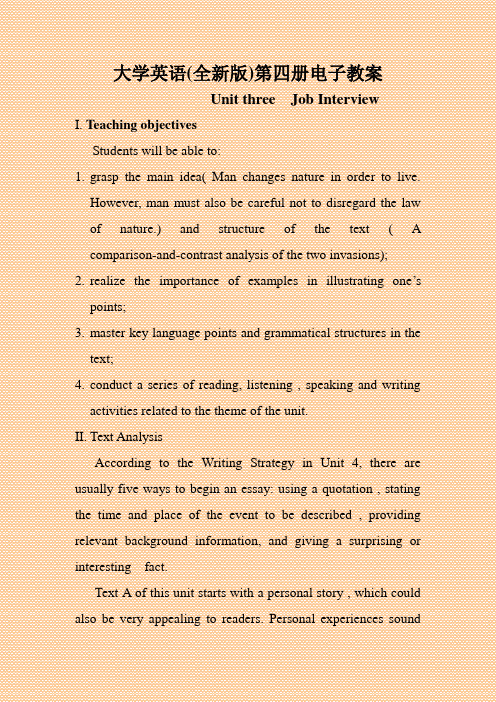
大学英语(全新版)第四册电子教案Unit three Job InterviewI. Teaching objectivesStudents will be able to:1.grasp the main idea( Man changes nature in order to live.However, man must also be careful not to disregard the law of nature.) and structure of the text ( A comparison-and-contrast analysis of the two invasions);2.realize the importance of examples in illustrating one’spoints;3.master key language points and grammatical structures in thetext;4.conduct a series of reading, listening , speaking and writingactivities related to the theme of the unit.II. Text AnalysisAccording to the Writing Strategy in Unit 4, there are usually five ways to begin an essay: using a quotation , stating the time and place of the event to be described , providing relevant background information, and giving a surprising or interesting fact.Text A of this unit starts with a personal story , which could also be very appealing to readers. Personal experiences soundreal. They can also narrow the distance between the author and the reader.Then the author offers four keys to getting hired. All are instructive yet each is begun in a way different from the rest stylistically . Let’s have a closer look at them one by one.Key 1 starts with a quotation—“If you miss one day of practice, you notice the difference,”the saying goes among musicians. “ If you miss two days of practice, the critics notice the difference. If you miss three days of practice, the audience notices the difference.”Key 2 starts with a surprising fact—“Recently I played a doubles tennis match paired with a 90-year-old.”Key 3 begins with a question—“Do you remember the four –minute mile?”Key 4 begins with a personal opinion—“In my opinion, the majority of New York cabdrivers are unfriendly , in not downright rude. Most of the cabs are filthy, and almost all of them sport an impenetrable, bulletproof partition”.All this makes the article more appealing to the reader.III. Cultural Notes:IV. Language Study1.applicantn. a person who applies for sth., esp. a post 求职者,申请人e.g. Graduate schools generally require applicants to submitscores on the Graduate Record Exam (GRE).2.supplier: n. a business that supplies goods to services to apurchaser 供应厂商;供应者e.g. They used to be a leading supplier of military equipment.他们曾是军用设备的供应商.I’ll contact the supplier and see if I can get the paint you want by Friday.我会和供应厂商联系,看能不能在星期五之前搞到你要的涂料.3.interviewvt. question to decide if sb. is right for a job 面试e.g. John is being interviewed next week for the ChiefExecutive's job.4. grillvt. (infml) question intensely; cook under or over direct heat 盘问;烧烤e.g. Tom was grilled by customs officers for several hours.After being grilled by the police for two days, Johnson signed a confession.被警方盘问了两天之后, 约翰逊在招供书上签了字.Her parents would grill her about where she’d been.她父母会盘问她去过什么地方.I decided to grill the sausages rather than fry them.我决定把这些香肠烤一烤, 而不是油炸.5.mock: a. simulated; artificial, but similar to the original 模拟的; 仿制的e.g. Mock interviews and tape-recording answers will payhandsome dividends at the interview itself.做模拟面试并录下回答会使你在真正面试时大获裨益.“Might be true,” said Harry with a look of mock horror on his face.“也许是真的,”哈里说道, 脸上带着装出来的恐怖表情..6. follow uptake additional steps to further (a previous action) 采取进一步行动e.g. If you make a hotel booking by phone, follow it up withwritten confirmation.The idea sounded interesting and I decided to follow it up.这个想法很有意思,我决定进一步深入研究.He decided to follow up on his initial research and write a book.他决定对初步研究作进一步拓展,写成一本书.7.in sb's handsin sb.'s possession 在某人手中,为某人所拥有e.g. His father's company has been in his hands for someyears.The affair is no longer in my hands.这事已经不归我管了.Unless I receive a satisfactory response from you withina month I shall put this matter in the hands of mysolicitor.除非在一个月之内收到满意的答复, 不然我会把这件事交给我的律师去管.8. prospectivea. likely to become or be 可能成为的;预期的e.g. The chief function of direct-mail advertising is tofamiliarize prospective buyers with a product.We’ve had three sets of prospective buyers looking round the house.已经有三批想买房子的顾客来这儿看过了.We have received letters of application from severalprospective candidates.我们已经收到了好几位投考者的申请信.9.as I see itin my opinion 在我看来e.g. As I see it, this press conference is the most successfulone we have ever had.As I see it , this is the best book on the subject.10.(as) the saying goes俗话说,常言道e.g. As an old English saying goes, "If you want to live andthrive, let a spider run alive!"As the saying goes, “He who laughs last laughs longest.”11.e ndeavorn. an effort or attempt to do sth. 努力,尽力v. try (to do sth.) 努力(做某事),尽力(做某事)e.g. Please make every endeavor to arrive punctually.In spite of our endeavors , it has proven impossible to contact her.尽管我们尽了最大的努力,结果还是联系不上她.Crossing the North Pole foot was an amazing feat of human endeavor.徒步穿越北极是人类的一大壮举.Engineering are endeavoring to locate the source of the problem.工程师们正努力寻找问题的症结所在.12.d o one’s homework: make preparation beforehand 事先做好准备e.g. It was obvious that she had done her homework andthoroughly prepared for her interview.显然她为面试作了充分的准备.The politician had clearly not done his homework for theconference.那个政客会前显然没有做准备工作.He had done his homework before he delivered thespeech.13.g o aftertry hard to obtain 努力争取,追求e.g. Are you planning to go after Peter's job when heleaves?14.w ander: v. walk around slowly in a relaxed way or withoutany clear purpose or direction 漫游; 闲逛e.g. I’ll just wander around the mall for half an hour.我就在商城里逛半小时.He was here a moment ago but he’s wandered offsomewhere.他刚才还在这儿, 不过现在走了.15.w ork on: spend time working in order to produce something ;try hard to produce improve something 从事于; 至力于; 努力改进e.g. She’s based in the lab, working full-time on a cure forSARS.她就住在实验室,全部时间都至力于找出治疗“非典”的方法.His dancing technique is good, but he needs to work on his fitness.他的舞技不错,但需要增进体能.16.incidentallyad. by the way(used when adding more information to what was said before, or when you want to talk about sth. else you have just thought of )顺便提起地,附带地e.g. Incidentally, this wine goes particularly well with cheese.Incidentally, if you want to see her again , let me know. 17.chucklevi. 咯咯地笑e.g. The professor chuckled when we told her that we wereafraid of her.She sat reading the comic, chucking to herself.Chuckle 轻声地笑; 暗自笑(通常是低声或无声的,也可以是独自阅读或思考时的反应.Chortle大声地笑;咯咯地笑(通常声音较大,而且多是当众的)e.g. He chuckled to himself when he remembered the trick he’d played on them.他想起捉弄他们的事就忍俊不禁.When I told them what had happened to me, they all chortled with mirth.我把我的事告诉他们以后,他们全都咯咯地笑了.18.p hysicallyad. with regard to the body; according to the laws of nature 身体上地;按自然法则地physical a. of or concerning the body; of or concerning the laws of nature 身体的;按自然法则的e.g. Physically I find him very attractive, but we don't havethe same outlook on life.Human populations differ in their skin color, eye colorand shape, hair color and other physical characteristics.Regular exercise enhances people’s sense of mental wellbeing along with their general physical health.19.c rackn. an attempt or try; a sharp snapping sound 尝试;噼啪声take/have a crack (at) try to do (sth.) 尝试e.g. They have decided to have a crack at the doubleschampionship.It’s not something I’ve done before , but I’ll have /take a crack at it.这事我从没干过,可是我要试试.Have another crack at solving this puzzle.再试试解这个谜吧.20.d eadlinen. a time limit by which sth. must be done 最终期限e.g. Tomorrow is the deadline for the students to hand in theirterm paper.21.identifiablecapable of being identified 可识别的,可确认的identify vt. 识别,鉴别e.g. In her bright yellow coat, she was easily identifiable inthe crowd.22.make a differencechange the situation or outlook; have an effect 改变现状或观点;产生影响e.g. Having a good teacher has made all the difference forAlex.Where you live can make such a difference to the way you feel.Exercise can make a big difference to your state of health.锻炼可以使你的健康状况大为改观.Putting up some new wallpaper in the bedroom has made a difference.卧室里贴上新墙纸后看起来不一样了.23.f ilthy: a. extremely or unpleasantly dirty 非常肮脏的, 污秽的e.g. Wash your hands—they are filthy.I’ve never smoked – it’s filthy habit.我从未抽过烟---抽烟是个坏习惯.The boys were filthy when they came in from football.男孩们踢完球后进来时身上都很脏.24.s port: v. exhibit; display 展示,显示e.g. The front of the car sported a German flag.车前面挂着一面德国国旗.Back in the 1960s he sported bell- bottom trousers,platform heels and hair down past his shoulders.60年代时,他神气活现地穿着喇叭裤, 厚底鞋,留着披肩长发.25.p artition : a thin wall or screen that divides a room or otherindoor spacee.g. Glass partition divided the room into individual office.Her taxicab has a thick Perspex partition between the passenger’s seat and the drive.26.blurtvt. utter abruptly and thoughtlessly 未加思索地冲口说出e.g. As soon as the teacher put forward the question, heblurted the answer out.He blurted everything out about the baby, though we’dagreed to keep it a secret for a while.Peter blurted the secret out before we could stop him. 27.p ryvi. try to look into private facts about a person 窥探,探究e.g. We don't want people prying into our affairs.Some reporters like to pry into film stars’ private life. 28.i n the neighborhood ofabout 大约e.g. He has an annual salary in the neighborhood of $40,000.I am hoping to buy an apartment in the neighborhood of200,000 yuan.29.beyond anyone's/one's wildest dreamsmore than anyone /one can ever imagine 无论如何也想不到的,做梦也不敢想的e.g. Ten years ago it was beyond my wildest dreams that Icould afford a car.Scientists have made an invention which is to change ourlives beyond our wildest dreams.The scheme succeeded beyond my wildest dreams.我做梦也想不到这个计划居然成功了.30.sparklevi. 闪烁,闪耀e.g. The diamond ring sparkled in the sunlight.31.standpointn. 立场, 观点from one's/the standpoint (of) :from one's/the viewpoint (of) 从…的观点来看e.g. From humans standpoint, all of the world's physicalresources are in finite supply.In recent years, some psychologists have tried to explainintelligence from a biological standpoint.。
大学英语unit4教案
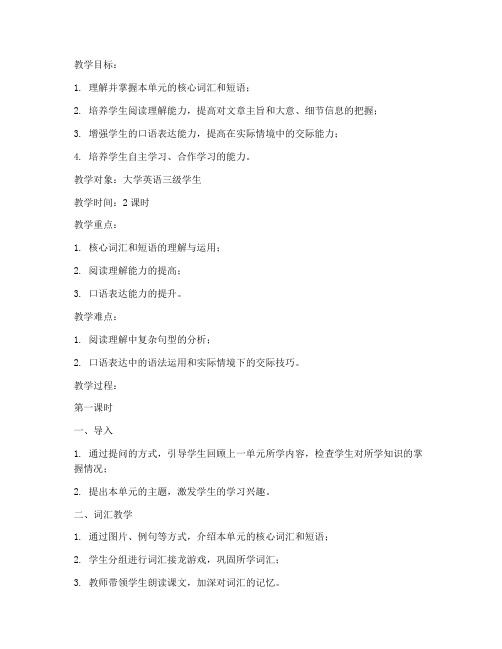
教学目标:1. 理解并掌握本单元的核心词汇和短语;2. 培养学生阅读理解能力,提高对文章主旨和大意、细节信息的把握;3. 增强学生的口语表达能力,提高在实际情境中的交际能力;4. 培养学生自主学习、合作学习的能力。
教学对象:大学英语三级学生教学时间:2课时教学重点:1. 核心词汇和短语的理解与运用;2. 阅读理解能力的提高;3. 口语表达能力的提升。
教学难点:1. 阅读理解中复杂句型的分析;2. 口语表达中的语法运用和实际情境下的交际技巧。
教学过程:第一课时一、导入1. 通过提问的方式,引导学生回顾上一单元所学内容,检查学生对所学知识的掌握情况;2. 提出本单元的主题,激发学生的学习兴趣。
二、词汇教学1. 通过图片、例句等方式,介绍本单元的核心词汇和短语;2. 学生分组进行词汇接龙游戏,巩固所学词汇;3. 教师带领学生朗读课文,加深对词汇的记忆。
三、阅读理解1. 学生自主阅读课文,完成课后练习;2. 教师讲解阅读理解中的重点和难点,引导学生分析文章结构、主旨和大意;3. 学生分组讨论,分享阅读心得。
四、口语表达1. 教师引导学生进行角色扮演,模拟实际交际场景;2. 学生分组进行口语练习,提高口语表达能力;3. 教师点评学生的口语表达,提出改进意见。
第二课时一、复习1. 复习上一节课所学内容,检查学生对知识的掌握情况;2. 学生展示本节课所学词汇和短语,巩固记忆。
二、阅读理解1. 学生自主阅读课文,完成课后练习;2. 教师讲解阅读理解中的重点和难点,引导学生分析文章结构、主旨和大意;3. 学生分组讨论,分享阅读心得。
三、口语表达1. 教师引导学生进行角色扮演,模拟实际交际场景;2. 学生分组进行口语练习,提高口语表达能力;3. 教师点评学生的口语表达,提出改进意见。
四、总结与作业布置1. 教师对本节课所学内容进行总结,强调重点和难点;2. 布置课后作业,巩固所学知识。
教学反思:本节课通过词汇、阅读理解和口语表达等多个方面的教学,帮助学生掌握大学英语Unit 4 的核心知识。
新编大学基础英语综合教程4 教案unit
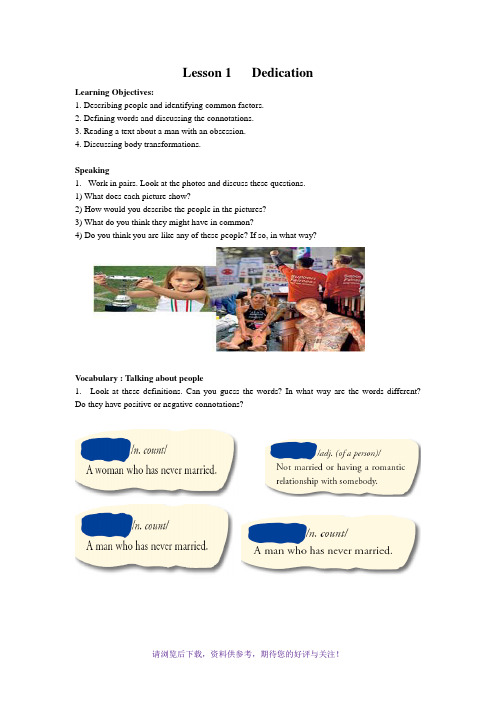
Lesson 1 DedicationLearning Objectives:1. Describing people and identifying common factors.2. Defining words and discussing the connotations.3. Reading a text about a man with an obsession.4. Discussing body transformations.Speaking1.Work in pairs. Look at the photos and discuss these questions.1) What does each picture show?2) How would you describe the people in the pictures?3) What do you think they might have in common?4) Do you think you are like any of these people? If so, in what way?Vocabulary : Talking about people1. Look at these definitions. Can you guess the words? In what way are the words different? Do they have positive or negative connotations?2. Can you think of any other similar examples?traditional —old-fashioned —conventional3. Look at the following words, which are all synonyms of determined. Do the words have positive or negative connotations? Divide them into two groups, using a dictionary to help you.4. Work in small groups and compare your e one of the words to describe someone youknow.My 11-year-old daughter is really obstinate —nothing I say can persuade her to read a book, she just watches rubbish on TV all the time.5. Read the short profiles below and decide which word in Exercise 3 best describes the person. More than one word may be appropriate.1) A politician who always gives her full support to her party leader, even when she does not agree with all the party’s policies unwavering2) An employee who works day and night to get a promotion, even though it will probably beThe three words mean unmarried.Single is used to describe men or women and has a neutral connotation.Bachelor is used to describe a man and has a fairly neutralSpinster is used to describe a woman and is an old-fashioned (often disapproving)term with the implication that the woman will never marry. Its connotation isnegative.Traditional:in accordance with tradition, beliefs and customs; it can have a positive or negative connotation. Compare It is traditional to give chocolate eggs as Easter presents in the UK with He was a very traditional father and they often had arguments.Old-fashioned: not modern, a person who believes in out-dated ideas and customs; it has a negative connotation.Conventional: following conventions or norms; it can have a negative connotation: He holds very conventional views on politics. It may also have a neutral connotation, e.g. My new car is a very conventional design.Positive: resolute, unwavering, dedicatedNegative: stubborn, wilful, obstinate, dogged( single-minded, strong-willed and persistent are dependent on context.)given to someone else. dogged/determined/persistent3) A woman who has recovered from cancer three times strong-willed/resolute4) A man who has failed his driving test ten times and is to take his test again next month. determined/persistent5) A child who refuses to wear blue trousers today. stubborn/wilful6) A president defending his club, which refuses membership to women. obstinate7) A girl who devotes all her free time to tennis practice and has no social life as a result. single-minded8) A single-parent father working, studying and bringing up two children. resolute/determinedSpeaking & Reading: Lexical preparation(1) go by sth.:to be guided by sth.; to form an opinion from sth.e.g. That’s a good rule to go by.2) lose count (of sth.): to forget the total of sth. before you have finished counting ite.g. She had lost count of the number of times she’d told him to be careful.Speaking & Reading1. Work in pairs. Make a list of the different ways that people typically choose to change their bodies.2. You are going to read an article about a man called Stalking Cat. What changes do you think he has made to his body?3. Read the article and check your ideas.4. Read the text again and decide if these statements are true (T) of false (F). If false, explain why.(1) Plastic surgery is still relatively unusual. FIt is now commonplace2) Dennis Avner can’t remember how many changes have been made to his body. T3) It is thought that a psychological illness may be the cause of Stalking Cat’s behaviour. T4) Because of the changes to his body, Cat is in constant pain. FT he procedures hurt at the time but there is no ongoing pain.5) The procedures Cat has undergone have been carried out illegally. FHe has to have the surgery carried out by a body modification artist because it would be illegal fora medical professional to alter appearance to this extent.6) Cat does not suffer any pain during the operations. FHe cannot have anaesthetic because only qualified doctors can administer it, so the operations arevery painful.7) He does not particularly enjoy making the changes to his body. T8) He will probably not make any more changes to his body. FHis goal is to become a perfect cross between a cat and a human, so it is likely he will continue.5. Look again at the adjectives in V ocabulary, Exercise 3. Which would you use to describe Stalking Cat?6. Work in pairs. Discuss these questions.1) Think of someone you know who has made changes to his / her body. Was he / she happy with the results? Why? / Why not?2) In what circumstances would you consider making changes to your body?3) If you could transform yourself into a perfect cross between a human and an animal, which animal would you choose? Why?7.Translate the following sentences into English.1)如果可以依据以往的经验,这个航班会晚点的。
新编大学基础英语综合教程4教案unit
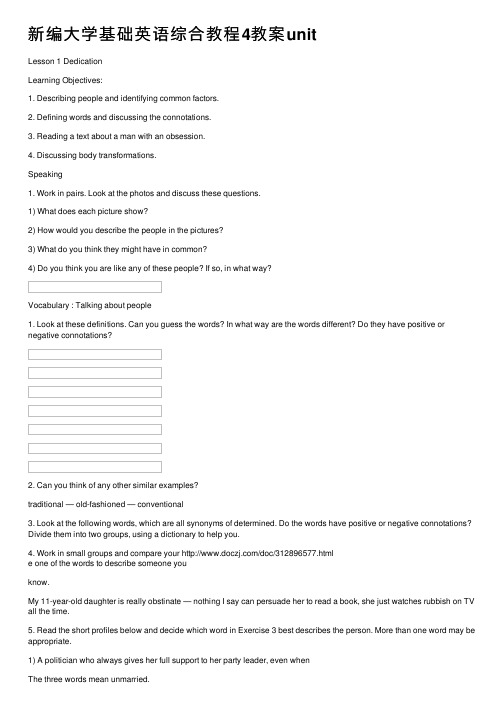
新编⼤学基础英语综合教程4教案unitLesson 1 DedicationLearning Objectives:1. Describing people and identifying common factors.2. Defining words and discussing the connotations.3. Reading a text about a man with an obsession.4. Discussing body transformations.Speaking1. Work in pairs. Look at the photos and discuss these questions.1) What does each picture show?2) How would you describe the people in the pictures?3) What do you think they might have in common?4) Do you think you are like any of these people? If so, in what way?Vocabulary : Talking about people1. Look at these definitions. Can you guess the words? In what way are the words different? Do they have positive or negative connotations?2. Can you think of any other similar examples?traditional — old-fashioned — conventional3. Look at the following words, which are all synonyms of determined. Do the words have positive or negative connotations? Divide them into two groups, using a dictionary to help you.4. Work in small groups and compare your /doc/312896577.htmle one of the words to describe someone youknow.My 11-year-old daughter is really obstinate — nothing I say can persuade her to read a book, she just watches rubbish on TV all the time.5. Read the short profiles below and decide which word in Exercise 3 best describes the person. More than one word may be appropriate.1) A politician who always gives her full support to her party leader, even whenThe three words mean unmarried.Single is used to describe men or women and has a neutral connotation.Bachelor is used to describe a man and has a fairly neutralSpinster is used to describe a woman and is an old-fashioned (often disapproving)term with the implication that the woman will never marry. Its connotation isnegative.Traditional:in accordance with tradition, beliefs and customs; it can have a positive or negative connotation. Compare It is traditional to give chocolate eggs as Easter presents in the UK with He was a very traditional father and they often had arguments.Old-fashioned: not modern, a person who believes in out-dated ideas and customs; it has a negative connotation. Conventional: following conventions or norms; it can have a negative connotation: He holds very conventional views on politics. It may also have a neutral connotation, e.g. My new car is a very conventional design.Positive: resolute, unwavering, dedicatedNegative: stubborn, wilful, obstinate, dogged( single-minded, strong-willed and persistent are dependent on context.)she does not agree with all the party’s policies unwavering2) An employee who works day and night to get a promotion, even though it will probablybe given to someone else. dogged/determined/persistent3) A woman who has recovered from cancer three times strong-willed/resolute4) A man who has failed his driving test ten times and is to take his test againnext month.determined/persistent5) A child who refuses to wear blue trousers today. stubborn/wilful6) A president defending his club, which refuses membership to women. obstinate7) A girl who devotes all her free time to tennis practice and has no social lifeas a result. single-minded8) A single-parent father working, studying and bringing up two children.resolute/determinedSpeaking & Reading: Lexical preparation(1) go by sth.: to be guided by sth.; to form an opinion from sth.e.g. That ’s a good rule to go by.2) lose count (of sth.): to forget the total of sth. before you have finishedcounting ite.g. She had lost count of the number of times she ’d told him to becareful.Speaking & Reading1. Work in pairs. Make a list of the different ways that people typically chooseto change their bodies.2. You are going to read an article about a man called Stalking Cat. What changesdo you think he has made to his body?3. Read the article and check your ideas.4. Read the text again and decide if these statements are true (T) of false (F).If false, explain why.(1) Plastic surgery is still relatively unusual. FIt is now commonplace2) Dennis Avner can ’t remember how many changes have been made to his body.T3) It is thought that a psychological illness may be the cause of Stalking Cat’s behaviour. T4) Because of the changes to his body, Cat is in constant pain. FT he procedures hurt at the time but there is no ongoing pain.5) The procedures Cat has undergone have been carried out illegally. FHe has to have the surgery carried out by a body modification artist because it would be illegal for a medical professional to alter appearance to this extent.6) Cat does not suffer any pain during the operations. FHe cannot have anaesthetic because only qualified doctors can administer it, so the operations are very painful.7) He does not particularly enjoy making the changes to his body. T8) He will probably not make any more changes to his body. FHis goal is to become a perfect cross between a cat and a human, so it is likely he will continue.5. Look again at the adjectives in Vocabulary, Exercise 3. Which would you use to describe Stalking Cat?6. Work in pairs. Discuss these questions.1) Think of someone you know who has made changes to his / her body. Was he / she happy with the results? Why? / Why not?2) In what circumstances would you consider making changes to your body?3) If you could transform yourself into a perfect cross between a human and an animal, which animal would you choose? Why?7. Translate the following sentences into English.1)如果可以依据以往的经验,这个航班会晚点的。
- 1、下载文档前请自行甄别文档内容的完整性,平台不提供额外的编辑、内容补充、找答案等附加服务。
- 2、"仅部分预览"的文档,不可在线预览部分如存在完整性等问题,可反馈申请退款(可完整预览的文档不适用该条件!)。
- 3、如文档侵犯您的权益,请联系客服反馈,我们会尽快为您处理(人工客服工作时间:9:00-18:30)。
1 Unit 1 Personal Qualities I. Teaching aims and demands 1. Understand the background knowledge 2. Learn about the new words and phrases 3. Grasp the main idea and structure of the text 4. Conduct a series of reading, listening, speaking and writing activities II. Teaching importance and difficulties 1.Background information 2.The usage of some new words and phrases 3.Some sentence patterns difficult to understand III. Teaching methods A combination of traditional teaching methods with the communicative approach will be adopted. Special attention should be paid to classroom interaction. More encouragement is needed and more guidance will be given to them in their extracurricular study. Use the multimedia device where necessary. IV. Teaching procedure a. Warming-up Activities 1.Duty Report Have a brainstorming about words to describe personal qualities 2. Information related to the text 1) Cross-cultural communication The key to effective cross-cultural communication is knowledge. First, it is essential that people understand the potential problems of cross-cultural communication, and make a conscious effort to overcome these problems. Second, it is important to assume that one’s efforts will not always be successful, and adjust one’s behavior appropriately. For example, one should always assume that there is a significant possibility that cultural differences are causing communication problems, and be willing to be patient and forgiving, rather than hostile and aggressive, if problems develop. One should respond slowly and carefully in cross-cultural exchanges, not jumping to the conclusion that you know what is being thought and said. Active listening can sometimes be used to check this out–by repeating what one thinks he or she heard, one can confirm that one understands the communication accurately. If words are used differently between languages or cultural groups, however, even active listening can overlook misunderstandings. 2) Personal qualities Personal qualities are personal characteristics of an individual. They are what make up one's personality. They help a person get along in a new situation. For example, dependability and patience are qualities that employers would like a good worker to have. Other qualities employers value are: honesty, assertiveness, flexibility, problem solving, friendliness, intelligence, leadership, enthusiasm, and a good sense of humor.Most employers want people who are dependable and who get along with others. Though skills are important, an employer will select new employees based 2
on their personal qualities as well. b. Language points 1. Personal qualities generally have either positive or negative connotations. 一般来说,一个人的品质包括两个方面:积极的和消极的。 either or 要么…要么 neither nor 既不...也不 2.Our attitudes toward such personal qualities are partly personal,partly social,and partly cultural. 我们对于个人品质的态度因个人、社会、文化因素而异。 attitude toward/to 对…的态度 partly=in part= in a way=to some extent=to some degree E.g. But this forecast was only partly true. 但这个预言只是部分地实现了。 The reason why one is fat is partly caused by overeating. 造成肥胖的部分原因是饮食过多。 The hot weather is partly to blame for the water shortage. 炎热的天气部分归因于缺水。 3.Some people also feel that gender play a role,with some qualities being more positively valued by women than by men and vice versa. 有些人认为性别也是一个影响因素,对于某些品质女性比男性更为看重,反之亦然。 play a role 起作用=play an part in vice versa 反之亦然 E.g. You hide nothing of yourself and can tell the other anything because you know they accept you just the way you are and vice versa. 你丝毫也不掩饰自己,能告诉对方任何事情,因为你知道对方接受的就是你现在的这个样子,反之亦然。 He likes me, and vice versa. 他喜欢我,我也喜欢他。 Vice versa可能是一组外来词组中的一个,这些词组在正常谈话中用得很紧凑,所以没有人会考虑它们的外国来源或者以前的意思。 Versa可以被认为与 reverse有关系,这样,不论 versa还是 -verse在 reverse中都可以追溯到拉丁文动词 vertere,“旋转” Versa实际上按照形式可以追溯到 vertere的过去分词 versus,但是按照句法可以追溯到“倒转,转换成对面”的意思。Vice是名词 vix用来表达“一个相互的关系”的绝对离格形式。整个词组的原义是“相互的关系被调换了”或者“正常的顺序反过来,反过来说。”这个词组于1601年首次记录在英语用法中。 5. Such attitudes are not always static. 这些态度并不总是一成不变的。 系V.+adj.=系表结构。 I am so ____ (please) to hear that. Key: pleased 解析:系表结构。 系表结构有两部分构成:连系动词和表语 一 连系动词: 连系动词分为三类:be 动词,感
